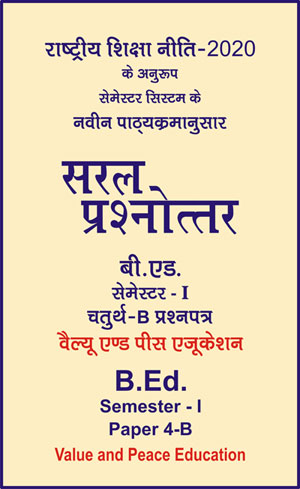|
बी एड - एम एड >> बी.एड. सेमेस्टर-1 प्रश्नपत्र-IV-B - वैल्यू एण्ड पीस एजुकेशन बी.एड. सेमेस्टर-1 प्रश्नपत्र-IV-B - वैल्यू एण्ड पीस एजुकेशनसरल प्रश्नोत्तर समूह
|
5 पाठक हैं |
||||||
बी.एड. सेमेस्टर-1 प्रश्नपत्र-IV-B - वैल्यू एण्ड पीस एजुकेशन (अंग्रेजी भाषा में)
Chapter 3 - Classification of Values
Question- How will you classify the Values in your words?
Answer -
Classifying values has always been a complicated task and have been classified differently. This is due to the fact that there are no hard and fast rules to classify values as they are closely interlinked and interrelated. Values are sometimes classified according to the needs and demands of the society.
Personal Values
Personal Values are personal to an individual both in terms of their possession and their use. It is a desire and cherished by the individual irrespective of his or her social relationship. Each and every individual like to imbibe these values at their personal level. These values make a person good for himself. Examples: ambition, cleanliness, discipline, honesty, loyalty, contentment, courage, creativity, determination, dignity of labour, diligence, excellence, hope, maturity, regularity, punctuality, self-confidence, self-motivation, simplicity, accomplishment, purity etc.
Social Values
Social values are certain behaviours and beliefs that are shared within specific cultures and social groups. These values are cherished and practiced because of our association with others. It imposes the interaction of two or more persons. Social values are always practised in relation to our neighbours, community, society, nation and world. These values are good for the society and form the basis of the relationship of an individual with other people in society. Examples: courtesy, charity, civic duty, fairness, goodness, neighbourliness, trust and truth, accountability, brotherhood, dutifulness, forgiveness, freedom, friendship, gratitude, hospitality, justice, love, patience, repentance, responsibility, service, sharing, sympathy, team spirit, tolerance etc.
Moral Values
Moral values are those values that enable an individual in making a distinction between right and wrong and good and bad etc. It particularly refer to the conduct of man towards man in the various situations in which human beings come together. They reveal a person’s self-control. Example: fairness, justice, equality, human dignity, honesty, integrity, sense of responsibility, compassion etc.
Spiritual Values
Spiritual values are characterized by the process of reflecting on non-material dimensions of life and acquiring insights into personal experiences, which are of enduring worth. They are related to soul and immaterial reality related. They are intangible and are not concerned with material things. They need not be religious values. They affect the individual in his relations with himself. Spiritual values are eternal and they do not change. They are real ideas. These are concerned with the realisation of the ‘Self’ and being one with ‘Divinity’. Examples: truth, beauty, goodness, unity, pure, love, joy, self-giving, contentment, wisdom, dispassion, self-discipline, devotion to God, etc.
Cultural Values
Cultural values are the standards of what is acceptable or unacceptable, important or unimportant, right or wrong in a community or society. It gives importance to preserve cultural practices, ceremonies, traditions and way of life which might be threatened by the materialistic culture of modern times. They maintain the integrity of language, behaviour, and traditional rites. Examples: hospitality, codes of conduct, social order, tolerance, gentleness, non-violence, love etc.
Ethical Values
Ethical values are a set of moral principles that apply to a specific group of people, professional field or form of human conduct and interaction. Ethics are based on the awareness that a human being is essentially spiritual and intrinsically valuable. Ethical values respect human rights through self-restraint, non-aggression, integrity, justice and honesty. A person with ethical values can be trusted and will be respected and revered. These values presuppose moral courage and the power to act according to one’s moral convictions even at the risk of financial, emotional or social security. These relate to our personal behaviour with our fellow beings. Among these we include values like honesty and truth etc. All moral values are also covered under ethical values.
Behavioural Values
Behavioural values refer to all good manner that are needed to make our life successful and joyous. They are those values which will express our conduct and behaviour in our daily life. Behavioural values will adorn our life and spread cordiality, friendliness, love all around. Example: cordiality, integrity, trustworthy, kindness, loyalty etc.
Instrumental Values
Instrumental values are such values that are useful in deriving some other benefit through them such as economic gain or an increase in status. Example: education, political power etc. A subject is said to have instrumental value when it is pursued, not for its own sake, but for some ends beyond itself. Instrumental values include preparatory or introductory, practical or utilitarian, socialising and conventional values.
Intrinsic Values
Intrinsic value are values which are judged well, not for something else, but in and of themselves. Intrinsic values are such values that are pursued and possessed for their own sake. It refers to the value of an object has solely by virtue of its ‘intrinsic properties’. Intrinsic values are said to be inherent in themselves. They are supposed to be invaluable in an absolute sense. Examples: goodness, beauty, artistic expression, happiness, truth and bliss. They themselves are the ends and not the means for achieving some other end.
Aesthetic Values
Values which give us pleasure and happiness are known as aesthetic values. Aesthetic values represent and seek to emulate the beauty of the Divine through the arts. To intensify appreciation, to strain and alert every sensitivity to a full appreciation of a value is to treat it as an aesthetic value. Things and activities which give joys of beauty are aesthetic values. Example: beauty, taste, architecture, calligraphy and literature.
Democratic Values
A person with democratic outlook is characterized by respect for individuality, equal treatment to all, irrespective of their sex, caste, language, religion, colour, race, family status etc., ensuring equal social, political and religious rights to all, impartiality and social justice and respect for the democratic institutions.
|
|||||













